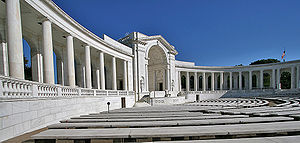(RNS) Fifty years ago, sociologist Robert Bellah wrote an influential essay claiming that the United States possessed a civil religion drawing on Christianity but distinct from any particular faith and embraced by most Americans.
Its deity was “God” (not Jesus), it conceived of America as a beacon to the rest of the world (the New Israel), and it held out national service and sacrifice as its highest ideals.
Institutionalized in war memorials and celebrated in observances such as Memorial Day, this American Civil Religion, or ACR, had as its principal scriptures the Declaration of Independence and iconic presidential pronouncements like Washington’s Farewell Address and Lincoln’s Gettysburg Address.
A recent example for Bellah was John F. Kennedy’s 1961 inaugural address, which concluded:
Finally, whether you are citizens of America or of the world, ask of us the same high standards of strength and sacrifice that we shall ask of you. With a good conscience our only sure reward, with history the final judge of our deeds, let us go forth to lead the land we love, asking His blessing and His help, but knowing that here on earth God’s work must truly be our own.
What redeemed the ACR from nationalist arrogance was a recognition that the country was ultimately answerable to God. “Without an awareness that our nation stands under higher judgment, the tradition of the civil religion would be dangerous indeed,” Bellah wrote. “Fortunately prophetic voices have never been lacking.”
The essay itself was meant to be a prophetic cry against the ongoing war in Vietnam, which Bellah considered a “time of trial” comparable to the Revolution and the Civil War. But in subsequent years, his faith in the ability of the ACR to summon the country’s better angels was increasingly shaken — and not without reason.
The ACR split on partisan lines, with Democratic presidents standing for service and sacrifice and Republican presidents for what came to be called American Exceptionalism. Under the aegis of the religious right, national God talk and civil religious language — “Judeo-Christian values,” for example — largely became the province of the GOP.
The president who sought to revive the ACR in its entirety was Barack Obama, who included each of its elements in his 2009 inaugural address:
For us, they packed up their few worldly possessions and traveled across oceans in search of a new life. For us, they toiled in sweatshops, and settled the West, endured the lash of the whip, and plowed the hard earth. For us, they fought and died in places like Concord and Gettysburg, Normandy and Khe Sahn…
Our Founding Fathers, faced with perils that we can scarcely imagine, drafted a charter to assure the rule of law and the rights of man — a charter expanded by the blood of generations. Those ideals still light the world, and we will not give them up for expedience sake…
We are a nation of Christians and Muslims, Jews and Hindus, and non-believers. We are shaped by every language and culture, drawn from every end of this Earth; and because we have tasted the bitter swill of civil war and segregation, and emerged from that dark chapter stronger and more united, we cannot help but believe that the old hatreds shall someday pass; that the lines of tribe shall soon dissolve; that as the world grows smaller, our common humanity shall reveal itself; and that America must play its role in ushering in a new era of peace…
Let it be said by our children’s children that when we were tested we refused to let this journey end, that we did not turn back nor did we falter; and with eyes fixed on the horizon and God’s grace upon us, we carried forth that great gift of freedom and delivered it safely to future generations…
It was good rhetoric, but the revival failed to materialize. This week’s election suggested why.
Service to country? Donald Trump not only advocated none, but prided himself on not even paying his taxes.
Sacrifice? He belittled a tortured prisoner of war (“I like soldiers who don’t get captured”) and sneered at a family whose son gave his life for the country.
Shining City on a Hill? For him, “making America great again” meant not being a light unto the nations but turning them into losers.
As for acknowledging that America stands under a higher judgment, the president-to-be could not even acknowledge that he might himself have done a thing to repent of. If there’s ever been a president less capable of invoking God, I don’t know who it was.
But to the Americans who voted for him, including a large majority of the more religious among us, none of that seemed to matter. Robert Bellah, who died three years ago at the age of 86, is rolling over in his grave.
(Mark Silk is professor of religion in public life at Trinity College and director of the college’s Leonard E. Greenberg Center for the Study of Religion in Public Life. He writes the Spiritual Politics column for RNS)






